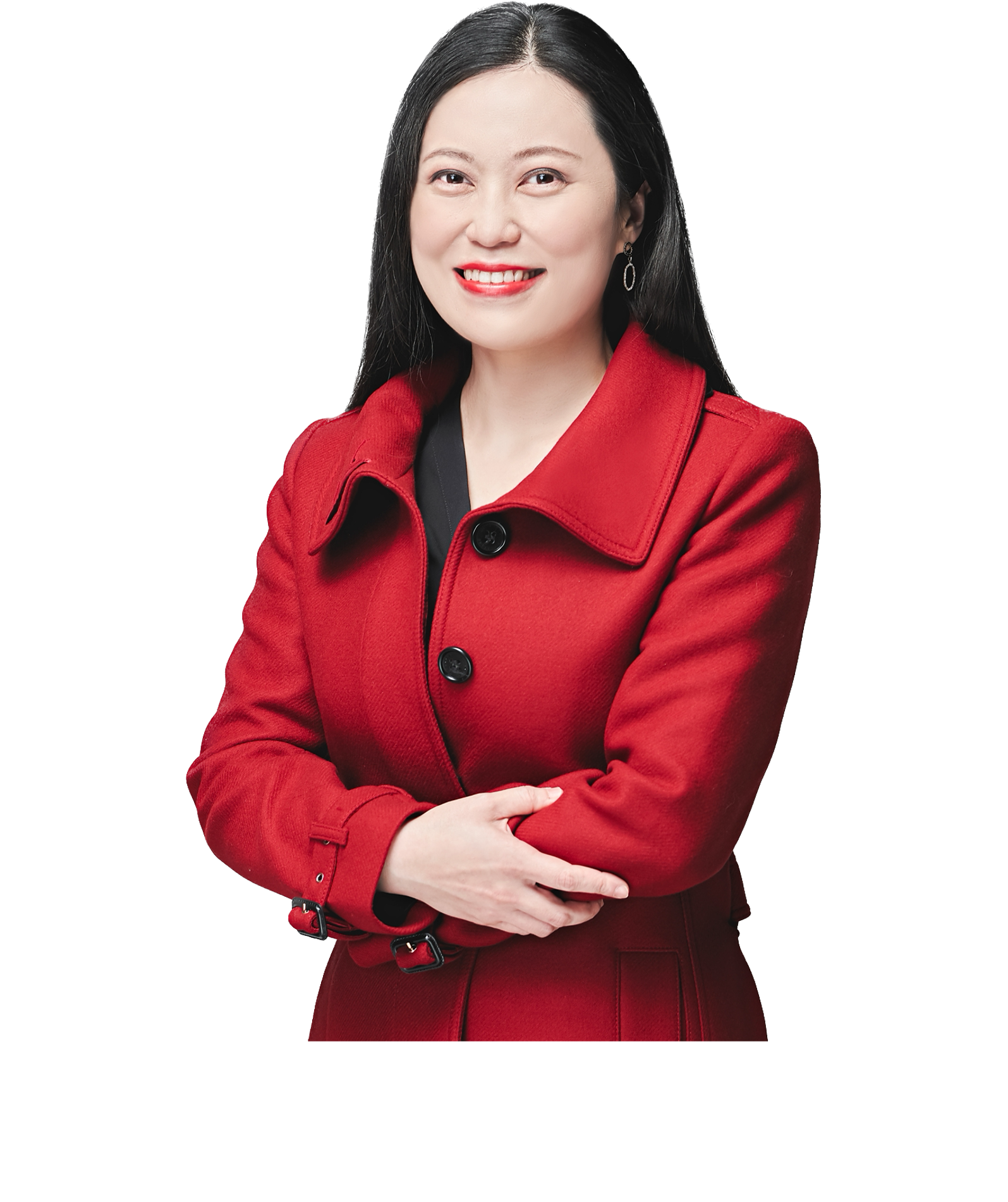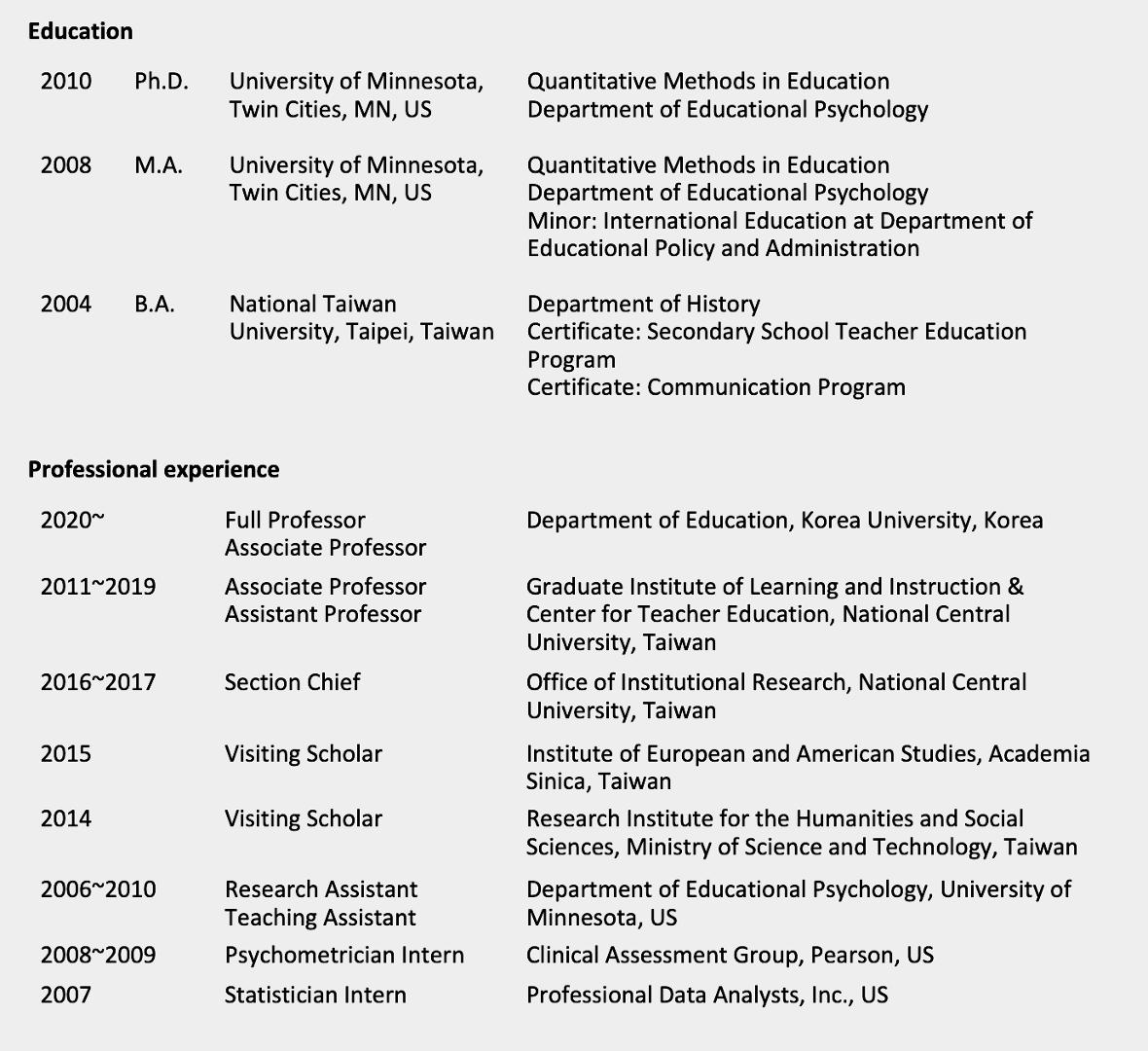Department of Education
at Korea University
Applied Quantitative Methods on Substantive Educational Issues
Recruiting Graduate Students

Welcome
About me
I am a Professor in the Department of Education at Korea University. My research agenda has focused on examining the contribution of multiple motivational constructs to students’ engagement and learning using international large-scale student assessment (ILSA) datasets and quantitative techniques. My current substantive research centers on how culture influences motivational processes and why cultural differences in motivation emerge. How to develop an educational environment for sharpening students' citizenship literacy in this rapidly changing world is another research interest. Delving into the intricacies of existing datasets from diverse geographic contexts and undertaking thorough comparative analyses, I channel my research fervor toward deriving insightful implications aimed at enhancing educational outcomes and social equality. I also conducted program evaluations for STEM education and institutional research during certain periods of my academic career.
My works cutting across these themes have been published in rigorous peer-reviewed journals in the fields of science education, educational psychology, educational measurement, and higher education. Ranked as the fifth most productive author in ILSA for education research, as evidenced by a bibliometric review study in 2021, these contributions underscore my dedication to advancing scholarly discourse in the field. I currently serve on the editorial boards of the Journal of Research in Science Teaching, the International Journal of Science Education, the International Journal of Science and Mathematics Education, the Journal of Experimental Education, and the Journal of Youth and Adolescence. I also have reviewed manuscripts from more than 70 journals, spinning a diverse range of manuscripts at the intersection of education, psychology, and social sciences.
View my academic CV
Student Recruitment
I am recruiting promising students who are interested in applying quantitative methods to tackle substantive educational topics. There are a variety of scholarships and financial assistance for promising students, such as the BK 21 scholarship, teaching assistantship, and graduate school scholarships. Students interested in applying for the graduate program are welcome to contact me (pyliou@korea.ac.kr) to get more information.
Education & Experience

Publications
Liou, P.-Y.*, Jang, J., & Myoung, E. (2024). Synergistic effects of students' mathematics and science motivational beliefs on achievement and their determinants. International Journal of STEM Education.
Suh, H., Liou, P.-Y., Jeong, J. S., & Kim, S. Y. (2024). Perfectionism, prolonged stress reactivity, and depression: A two-wave cross-lagged analysis. Journal of Rational-Emotive & Cognitive-Behavior Therapy, 42(1), 54–68. http://10.1007/s10942-022-00483-x
Liou, P.-Y.*, & Myoung, E. (2023). Teacher-perceived science inquiry-based instructional practice on student achievement and motivational beliefs in classroom contexts. Science Education, 107(6), 1485–1506. https://doi.org/10.1002/sce.21812
Jang, J., Yoo, H., & Liou, P.-Y.* (2023). Effects of collaboration on teachers’ job satisfaction and self-efficacy: Personal and structural characteristics as moderators. Educational Studies. 1–23. https://doi.org/10.1080/03055698.2023.2256924
Liou, P.-Y., Lin, Y.-M., Huang, S.-C., & Chen, S. (2023). Gender differences in science motivational beliefs and their relations with achievement over grades 4 and 8: A multinational perspective. International Journal of Science and Mathematics Education, 21(1), 233–249. https://doi.org/10.1007/s10763-021-10243-5
Liou, P.-Y., Huang, S.-C., & Chen, S. (2022). Longitudinal relationships between school burnout, compulsive Internet use, and academic decrement: A three-wave cross-lagged study. Computers in Human Behavior, 107363, 1–8. http://doi.org/10.1016/j.chb.2022.107363
Myoung, E., & Liou, P.-Y.* (2022). Adolescents’ political socialization at school, citizenship self-efficacy, and expected electoral participation. Journal of Youth and Adolescence, 51(7), 1305–1316. https://doi.org/10.1007/s10964-022-01581-w
Myoung, E., & Liou, P.-Y.* (2022). Systematic review of empirical studies on international large-scale assessments of civic and citizenship education. Scandinavian Journal of Educational Research, 66(7), 1269–1291. https://doi.org/10.1080/00313831.2022.2131903
Liou, P.-Y.* (2021). Students’ attitudes toward science and science achievement: An analysis of the differential effects of science instructional practices. Journal of Research in Science Teaching, 58(3), 310–334. https://doi.org/10.1002/tea.21643
Liou, P.-Y.*, Wang, C.-L., Lin, J. J. H., & Areepattamannil, S. (2021). Assessing students’ motivational beliefs about learning science across grade level and gender. The Journal of Experimental Education, 89(4), 605–624. https://doi.org/10.1080/00220973.2020.1721413
Liou, P.-Y., & Lin, J. J. H. (2021). Comparisons of science motivational beliefs of adolescents in Taiwan, Australia, and the United States: Assessing the measurement invariance across countries and genders. Frontiers in Psychology, 12(674902), 1–13. https://doi.org/10.3389/fpsyg.2021.674902
Liou, P.-Y.*, & Bulut, O. (2020). The effects of item format and cognitive domain on students’ science performance in TIMSS 2011. Research in Science Education, 50(1), 99–121. https://doi.org/10.1007/s11165-017-9682-7
Chen, L.-T., Ding, Q.-W., Hsieh, C.-Y., Chen, Y.-K., Chiang, Y., Huang, S.-C., Yang, T.-R., Cheng, C., Liou, P.-Y., & Peng, C.-Y. J. (2020). Effect size reporting practices in Taiwanese psychology and education journals: Review and beyond. Chinese Journal of Psychology, 62(4), 553–592. https://doi.org/10.6129/CJP.202009_62(4).0006 (In Chinese)
Liou, P.-Y.*, Wang, C.-L., & Lin, J. J. H. (2019). Pathways of parental involvement through students’ motivational beliefs to science achievement. Educational Psychology, 39(7), 960–980. https://doi.org/10.1080/01443410.2019.1617410
Lin, J. J. H., & Liou, P.-Y.* (2019). Assessing the learning achievement of students from different college entrance channels: A linear growth curve modeling. Assessment & Evaluation in Higher Education, 44(5), 732–747. https://doi.org/10.1080/02602938.2018.1532490
Liou, P.-Y.*, & Ho, J. H. N. (2018). Relationships among instructional practices, students’ motivational beliefs and science achievement in Taiwan using hierarchical linear modelling. Research Papers in Education, 33(1), 73–88. https://doi.org/10.1080/02671522.2016.1236832
Wang, C.-L., & Liou, P.-Y.* (2018). Patterns of motivational beliefs in the science learning of total, high-, and low-achieving students: Evidence of Taiwanese TIMSS 2011 data. International Journal of Science and Mathematics Education, 16(4), 603–618. https://doi.org/10.1007/s10763-017-9797-3
Liou, P.-Y.* (2017). Profiles of adolescents’ motivational beliefs in science learning and science achievement in 26 countries: Results from TIMSS 2011 data. International Journal of Educational Research, 81, 83–96. https://doi.org/10.1016/j.ijer.2016.11.006
Wang, C.-L., & Liou, P.-Y.* (2017). Students’ motivational beliefs in science learning, school motivational contexts, and science achievement in Taiwan. International Journal of Science Education, 39(7), 898–917. https://doi.org/10.1080/09500693.2017.1310410
Huang, Y.-T., Liu, E. Z.-F., Lin, C. H., & Liou, P.-Y. (2017). Developing and validating a high school version of the robotics motivated strategies for learning questionnaire. International Journal of Online Pedagogy and Course Design, 7(2), 19–33. https://doi.org/10.4018/IJOPCD.2017040102
Davenport E. C., Davison, M., Liou, P.-Y., & Love, Q. U. (2016). Easier said than done: Rejoinder on Sijtsma and on Green and Yang. Educational Measurement: Issues and Practice, 35(1), 6–10. https://doi.org/10.1111/emip.12106
Liou, P.-Y.* (2015). Developing an instrument for assessing students’ concepts of the nature of technology. Research in Science & Technological Education, 33(2), 162–181. https://doi.org/10.1080/02635143.2014.996542
Liou, P.-Y.*, & Hung, Y.-C. (2015). Statistical techniques utilized in analyzing PISA and TIMSS databases in science education from 1996 to 2013: A methodological review. International Journal of Science and Mathematics Education, 13(6), 1449–1468. https://doi.org/10.1007/s10763-014-9558-5
Liou, P.-Y.*, & Liu, E. Z. F. (2015). An analysis of the relationships between Taiwanese eighth and fourth graders’ motivational beliefs and science achievement in TIMSS 2011. Asia Pacific Education Review, 16(3), 433–445. https://doi.org/10.1007/s12564-015-9381-x
Davenport, E. C., Davison, M., Liou, P.-Y., & Love, Q. U. (2015). Reliability, dimensionality, and internal consistency as defined by Cronbach: Distinct albeit related concepts. Educational Measurement: Issues and Practice, 34(4), 4–9. https://doi.org/10.1111/emip.12095
Liou, P.-Y.* (2014). Examining the big-fish-little-pond effect on students’ self-concept of learning science in Taiwan based on the TIMSS databases. International Journal of Science Education, 36(12), 2009–2028. https://doi.org/10.1080/09500693.2014.889331
Liou, P.-Y.* (2014). Investigation of the big-fish-little-pond effect on students’ self-concept of learning mathematics and science in Taiwan: Results from TIMSS 2011. Asia-Pacific Education Researcher, 23(3), 769–778. https://doi.org/10.1007/s40299-013-0152-3
Liou, P.-Y.* (2014). Evaluating measurement properties of attitudinal items related to learning science in Taiwan from TIMSS 2007. Journal of Baltic Science Education, 16(3), 856–869.
Liou, P.-Y.*, & Kao, P.-J. (2014). Validation of an instrument to measure students’ motivation and self-regulation towards technology learning. Research in Science & Technological Education, 32(2), 79–96. https://doi.org/10.1080/02635143.2014.893235
Liu, E. Z. F., Lin, C. H., Liou, P.-Y., Feng, H.-C., & Hou, H.-T. (2013). An analysis of teacher-student interaction patterns in a robotics course for kindergarten children: A pilot study. Turkish Online Journal of Educational Technology, 12(1), 9–18.
Lin, C. H., Liu, E. Z. F., Chen, Y. L., Liou, P.-Y., Chang, M., Wu, C. H., & Yuan, S. M. (2013). Game-based remedial instruction in mastery learning for upper-primary school students. Educational Technology & Society, 16(2), 271–281.
Liu, E. Z. F., Lin, C. H., Jian, P. S., & Liou, P.-Y.* (2012). The dynamics of motivation and learning strategy in a creativity-supporting learning environment in higher education. Turkish Online Journal of Educational Technology, 11(1), 172–180.
Liou, P.-Y.*, & Lawrenz, F. (2011). Optimizing teacher preparation loan forgiveness programs: Variables related to perceived influence. Science Education, 95(1), 121–144. https://doi.org/10.1002/sce.20409
Liou, P.-Y.*, Kirchhoff, A., & Lawrenz, F. (2010). Perceived effects of scholarships on STEM majors’ commitment to teaching in high needs schools. Journal of Science Teacher Education, 21(4), 451–470. https://doi.org/10.1007/s10972-010-9191-2
Liou, P.-Y.*, Desjardins, C., & Lawrenz, F. (2010). Influence of scholarships on STEM teachers: Cluster analysis and characteristics. School Science and Mathematics, 110(3), 128–143. https://doi.org/10.1111/j.1949-8594.2010.00016.x
* Corresponding author
Teaching
ANOVA and Regression (Graduate level)
Multilevel Modeling (Graduate level)
Scale Development (Graduate level)
Program Evaluation (Undergraduate level)
Comparative and International Education (Undergraduate level)
Asian Educational Leader (Graduate level)
- Comparative Education: Issues from International Large-scale Assessments
- Utilization of International Large-scale Assessment Data for Education Research (plan to be offered during the summer of 2025)
Contact
- 145 Anam-ro, Seongbuk-gu, Seoul 02841, Korea.
- Uncho-Useon Education Building Rm #702
